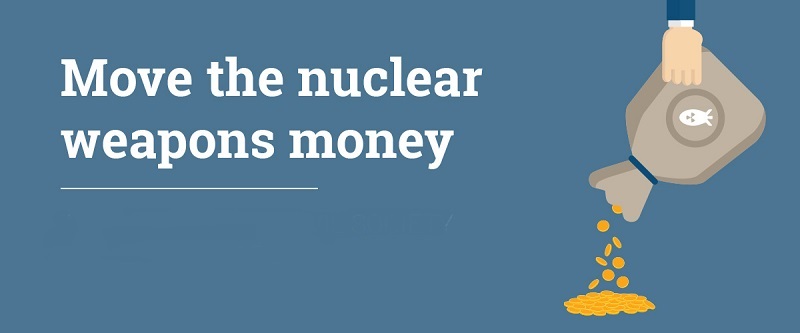Nuclear-armed states currently spend US$100 billion collectively on nuclear weapons programs every year.
The corporations manufacturing the weapons and their delivery systems are a major driver of the nuclear arms race. They actively lobby their parliaments and governments to continue allocating the funds to nuclear weapons. And they support think tanks and other public initiatives to promote the ‘need’ for nuclear weapons maintenance, modernization or expansion.
Many non-nuclear States support this through their public funds investing in nuclear weapons corporations.
United Nations negotiations start next week on a treaty to prohibit nuclear weapons. Most of the nuclear-armed States are staying out of the negotiations, so the treaty won’t apply directly to them. However, the initiative provides an opportunity to move all those States who join the treaty to end investments by their public funds, banks and other financial institutions, in nuclear weapons corporations
As such, UNFOLD ZERO has joined with the Basel Peace Office and Parliamentarians for Nuclear Non-proliferation and Disarmament in submitting a Working paper to the UN prohibition treaty negotiations on prohibiting the financing of nuclear weapons production.
‘Prohibiting the financing of nuclear weapons by States Parties to the nuclear prohibition treaty would help to delegitimize nuclear weapons production, and would put a dent in the power of the nuclear weapons corporations,’ says Alyn Ware, Director of the Basel Peace Office. ‘It would strengthen the power of civil society and parliamentarians within nuclear-armed States and globally to challenge the nuclear arms race.‘
The working paper highlights the experience of the Landmines and Cluster Munitions Conventions, which prohibited any activities that ‘assist, encourage or induce, in any way, anyone to engage in any activity prohibited to a State Party’ of the two conventions. This has led to many of the States parties already adopting measures to prohibit investments in companies manufacturing such weapons. Such action has impacted on the companies producing these weapons, reducing their capacity to sell such weapons even in the States that have not yet signed the treaties.
States negotiating the nuclear weapons prohibition treaty may be hesitant to prohibit financing of nuclear weapons, as it brings them into conflict with the financial interests of the nuclear-armed States.
However, the working paper notes that there is already some experience of Western governments – including New Zealand, Norway and Switzerland – enacting prohibitions on nuclear-weapons-financing which impacted on corporations of US, France and the UK. While there may have been opposition to this from the nuclear-armed States, it did not impact negatively on the economies of the countries enacting the prohibitions.
The working paper refers to the publication ‘Move the Nuclear Weapons Money: a handbook for civil society and legislators‘, which provides more detail on nuclear weapons budgets, corporate lobbying, the relationship between nuclear weapons budgets and meeting sustainable development budget goals, and other examples of nuclear divestment by cities, banks and individuals around the world.
From April 5-18, civil society around the world will undertake Global Actions on Military Spending. This could include promotion of the proposal for the UN nuclear prohibition treaty to include a prohibition on the financing of nuclear weapons.
Additional documents:
Liechtenstein statement to the UN nuclear ban treaty negotiations including prohibiting nuclear weapons investments
UN CONF. NGO WP.6 Working paper on prohibiting the financing of nuclear weapons productionAir Max 1

